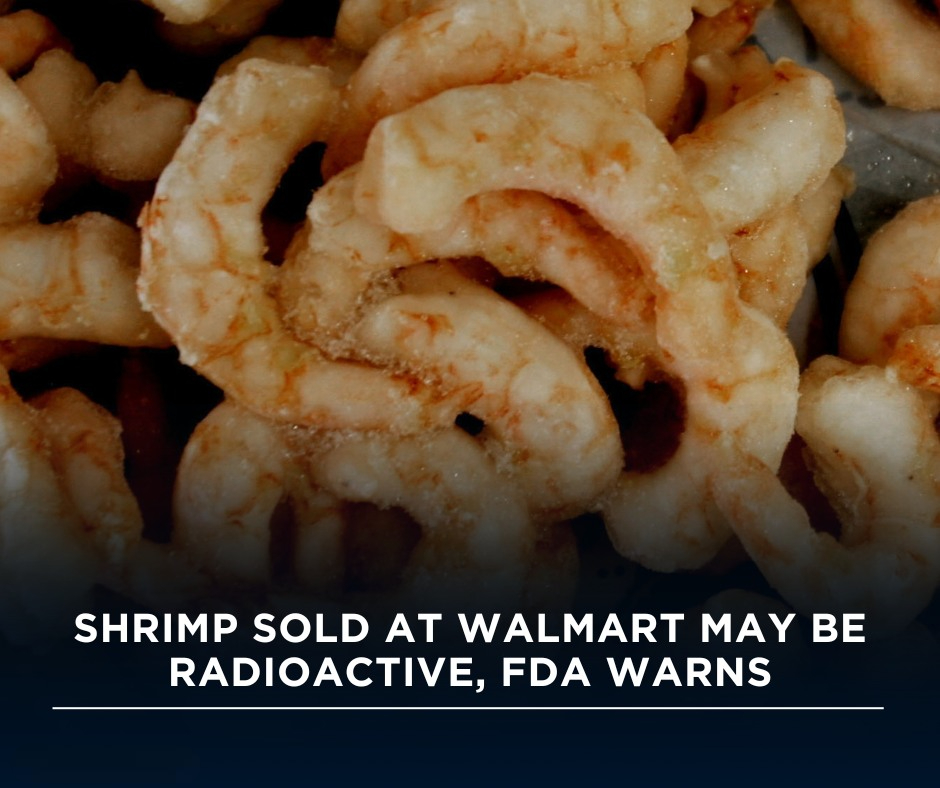The Food and Drug Administration has issued an alarming warning that has caught the attention of consumers across the country after finding traces of radioactivity in certain frozen shrimp products sold at Walmart, sparking concern and immediate recall efforts to protect public health.

According to the FDA, the affected products are specific lots of Great Value brand frozen raw shrimp that tested positive for Cesium-137, a radioactive isotope created during nuclear reactions, raising questions about food safety, import monitoring, and potential long-term health risks. While officials were quick to point out that the levels detected were below the FDA’s “derived intervention level,” meaning the amount does not pose an immediate acute hazard to humans, they emphasized that long-term exposure to even low levels of radiation has been linked to an increased risk of cancer, which is why swift precautionary measures are being taken.
The FDA confirmed that three specific lots of Great Value Frozen Raw EZ Peel Tail-On Farm-Raised White Vannamei Shrimp, sold in 2-pound bags, are affected by the recall. The products in question carry a Best-By date of March 15, 2027, an item code of 738108, and the lot codes 8005540-1, 8005538-1, and 8005539-1. These shrimp products were distributed across Walmart stores in several states, including Alabama, Arkansas, Florida, Georgia, Kentucky, Louisiana, Missouri, Mississippi, Ohio, Oklahoma, Pennsylvania, Texas, and West Virginia. Although the FDA noted that none of the contaminated shrimp has entered U.S.
commerce to date and that contaminated shipments have so far been intercepted at four U.S. ports, the agency stressed that consumers should not take any risks. Anyone who has purchased shrimp matching the recalled codes should immediately dispose of the product and refrain from eating or serving it to others. The issue has raised red flags because the shrimp in question were imported from Indonesia and processed by PT. Bahari Makmur Sejati, a seafood company that is now under strict scrutiny. The FDA announced that PT. Bahari Makmur Sejati has been added to an import alert list, meaning that all products from the company will be stopped at the border until the matter is resolved and the source of contamination identified.
Furthermore, U.S. regulators are working closely with Indonesian seafood authorities to determine how Cesium-137 ended up in the shrimp supply chain and to prevent further contaminated shipments from reaching American markets. While the FDA has reassured the public that its proactive recall is meant to prevent unnecessary radiation exposure, many consumers remain unsettled by the idea that radioactive material could find its way into everyday grocery items.
Experts note that Cesium-137 contamination is often linked to nuclear incidents, industrial accidents, or improper handling during processing, and its presence in food is a rare but serious concern. This situation also highlights the growing importance of strict oversight in global food supply chains, particularly for imported seafood, which makes up a significant portion of the U.S. market. The FDA’s collaboration with Customs and Border Protection is aimed at intercepting any additional contaminated shipments before they reach grocery store shelves, a reassurance that offers some comfort but does not erase consumer anxiety.
For now, the best course of action for anyone who may have purchased the affected shrimp is simple: check the packaging carefully, look for the identified lot numbers, and if there’s a match, dispose of the product safely without consuming it. While the FDA’s recall shows that safety systems are working as intended, the incident serves as a reminder of the vulnerabilities in a complex global food trade and the need for vigilance at every stage from processing to distribution.
Investigations are ongoing, and the FDA has promised to provide updates as more information becomes available, but until then, consumers are urged to remain cautious, informed, and proactive about food safety. At its core, this recall underscores a critical message: even though the detected levels of radiation may not cause immediate harm, eliminating any risk of unnecessary exposure is the safest choice, especially when it comes to protecting public health over the long term, and the FDA’s decisive actions aim to do just that by keeping potentially dangerous products out of American kitchens.





